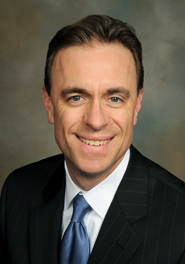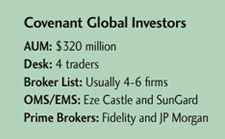From everything in equities to absolutely nothing. That was how big the change was for Oklahoma City-based hedge fund Covenant Global Investors. As a multi-strategy global macro fund, Covenant can invest wherever it sees opportunity, and when the market began to tank, the fund lost its taste for stocks.
“From ’03 to ’08, we were virtually all equity,” said Steve Shafer, chief investment officer of Covenant Global. “From late ’08 to about six or nine months ago, we were all credit, which is now starting to migrate back toward an equity-oriented portfolio mix.”

Currently, the fund has around 20 to 25 percent of its $320 million in assets allocated to stocks. Shafer and his team of three dedicated analysts do all of the trading themselves. Most of the equities they trade are large-cap global names that are fairly liquid, but they are increasingly using algorithms when trading more illiquid small-cap stocks. Shaffer is also interested in building up small-cap holdings through private transactions.
Like many institutional investors, Covenant has been slow to return to equities, but Shafer said the pendulum is swinging back toward investments in stocks. He predicts equity volumes will pick up in the future, but probably not all at once.
“I don’t necessarily think it will happen as smoothly or as quickly as investors would like,” Shafer said. “It will be a long, hard slog—two steps forward, one step back.”

Waiting for a return of equities could be a bit like watching grass grow, he added. It could happen so slowly, so subtly, that no one will really notice it until five years from now. Then, many investors might wake up and decide they should have invested long ago when valuations were cheap. Only then, it will be too late.
Currently, the equity markets are dominated by macro factors, and Shafer said that has created a disconnect between stock prices and companies’ fundamentals. Eventually, stock prices will get more in line with the value of individual businesses, and that should be good for the markets and good for long-term investors, he said.
In the meantime, macro events are likely to continue to whipsaw stocks around, creating opportunities for macro-oriented trading. Shafer predicts that over the next three to five years, the investors who win biggest will be those with intermediate time frames, as opposed to shorter-term or tactical traders.
While Shafer is always aware of the presence of high-frequency traders in the markets, they don’t concern him too much. He feels they exacerbate volatility, but for a fund like his, that isn’t necessarily a bad thing. Instead, he tries to make volatility work for him rather than against him.
That’s true whether he’s trading stocks in the U.S. or in foreign markets. Shafer said traders have to look at the world today as one large, global fabric, and not get caught up in where a company is domiciled. He gave the example of Banco Santander, which is based in Spain but only has a fraction of its assets exposed to that country.
If Shafer is in a hurry to buy a foreign stock, he’ll trade American depositary receipts, but his preference is to get the stock on the exchange where it normally trades. In those cases, he’ll use an outside broker—generally a large U.S.-based firm with an international presence—that will work his order throughout the day or sometimes over the course of a week or more.
When buying international stocks, Covenant will sometimes hedge out currency risk, but other times will choose not to do so in order to gain extra exposure to a certain currency. Currently, about 7 percent of the firm’s book is outright directional bets on currencies, and that is in addition to securities where the firm is embedding a currency position as well.
Though Covenant is global in focus, Shafer said he benefits from the region where his fund is based. Oklahoma is an important center for the oil and natural gas industry, and since the energy sector has such a large impact on the economy, he finds it helpful to be in a place where people are constantly aware of the rhythm of the oil business.
“When you’re saturated in it right here in your own backyard, then you’re going to discern some more finite elements around the character of what may be going on to a higher degree than someone who is farther away,” Shafer said.
And being centrally located in the heart of the country, Shafer can also take a plane to New York, San Francisco or wherever else he needs to go if he wants to get an up-close look at a company’s operations. That can be helpful when he wants to take a position on the fundamentals behind a stock name, an approach that could be making a comeback soon.



